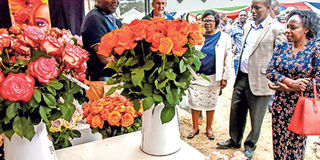Big day for flower enthusiasts at fair

Nakuru Governor, Lee Kinyanjui joins other visitors in sampling rose flowers at the Naivasha Horticultural Fair, which was held last weekend. Tens of flower enthusiasts, local and international, flocked the event now in its 16th year. PHOTO | AYUB MUIYURO | NMG
What you need to know:
- Richard McGonnell, the chairman of the fair, said that the event was one of their best as it attracted participants from China, US, Europe and other parts of the world.
- Kenya Flower Council chief executive Clement Tulezi said the available stock was going at a premium as some suppliers had increased the price.
- He termed the 16 percent VAT imposed on agro-chemical products as bad for the industry as it has a direct effect on production costs.
The Naivasha Horticultural Fair, which was held last week provided a great outing for flower growers, breeders, horticulturalists and farm input dealers, among others.
Tens of flower enthusiasts, local and international, flocked the event now in its 16th year. The fair was held at the Naivasha Sports Club and the exhibitors did not disappoint.
As expected, the top attraction at the exhibition were roses, the most popular flowers across the world and predominantly grown in Kenya.
However, show-goers also sampled carnations, lilies, alstromeria, gypsophilla, eryngiums, arabicum, hypericum and statice, amongst many others.
Richard McGonnell, the chairman of the fair, said that the event was one of their best as it attracted participants from China, US, Europe and other parts of the world.
“New farming technologies to save on water, energy and chemical use to boost productivity while reducing diseases were on display. Smallholder farmers also exhibited their products this time round,” he said.
However, as flower lovers celebrated successes in the industry, a dark cloud hung over the sector as players complained of shortage of fertiliser, noting the crisis spelt doom for the lucrative sector.
Kenya Flower Council chief executive Clement Tulezi said the available stock was going at a premium as some suppliers had increased the price.
“Some growers have signed contracts with different markets on the volumes that they are supposed to supply, especially during the high season and with the current fertiliser shortage, they might not be able to meet the contractual agreements,” said Tulezi.
He noted the problem has worsened in the last three months, with efforts by the umbrella flower body to have the issue resolved bearing minimal fruit.
VAT BAD FOR FLOWER INDUSTRY
He observed that the problem has been worsened by the counterfeit products that are finding their way into the market.
“The abrupt change is having a huge ramification on the products earmarked for export, hence the need for a serious discussion between sector players and the government,” said Tulezi.

Some of the exhibitors at the Naivasha Horticultural Fair, which was held last weekend. Richard McGonnell, the chairman of the fair, said that the event was one of their best as it attracted participants from China, US, Europe and other parts of the world. PHOTO | AYUB MUIYURO | NMG
He hailed the government’s effort to re-test imported fertiliser through the Kenya Bureau of Standards but termed the process as “extremely slow”.
“The process is slow to an extent that they cannot be able to release enough fertiliser to importers who in turn sell it to the growers,” he noted.
“We are pleading with the government to help us so that the thriving industry is not brought to its knees,” he added. The country has been grappling with the loss of more than Sh2.5 billion in 2014 fertiliser import scandal
“We cannot absolve some importers from blame, but any changes from the regulator’s needs should factor in the effects it will have on the consumers,” said Tulezi.
He termed the 16 percent VAT imposed on agro-chemical products as bad for the industry as it has a direct effect on production costs.
“If we are to pass over that to the buyer, our products will be very expensive compared to the prices of our competitors.”
He said the tax will make it extremely difficult for the country, a leading flower exporter, to compete with other flower growers across the globe.
“If anything happens to horticulture then we will probably have nothing to talk about with the export of the commodity standing at about 19 percent, only second to tea,” said Tulezi.





